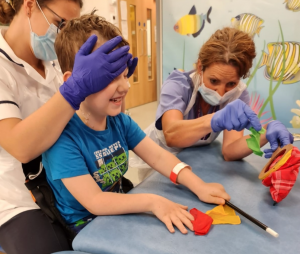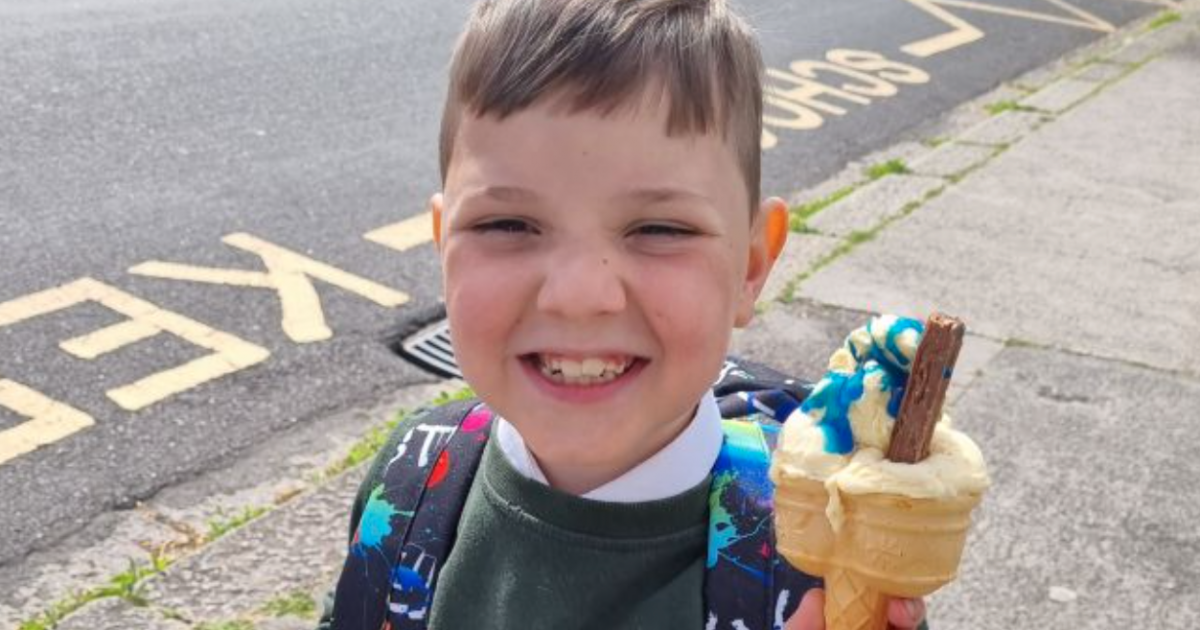A Delayed Diagnosis
- Lucas Pook-Parsonage, an 8-year-old boy from England, started having severe headaches and other neurological symptoms. Doctors dismissed it as anxiety, but it wound up being brain cancer.
- The little boy just had surgery, and has chemo next week. The family received some good news that the cancer had not spread, although he is having problems with his speech.
- Symptoms of childhood brain cancer can include: Headaches, blurred vision and nausea.
It was Medulloblastoma, the most common type of child brain cancer.
Read MoreRelated: 8-Year-Old Boy Who Beat Brain Cancer Wants to Be Like Batman
“Lucas was quickly taken into surgery to have fluid drained from his brain to take off the pressure and help [him] feel more comfortable,” the boy’s parents, Toni Davis and Gemma Pook, wrote. “He underwent another surgery two days later to have the mass removed, but the anesthesia caused him to go into anaphylactic shockmeaning the operation had to be halted prematurely for the child’s safety.”
Lucas is also suffering from posterior fossa syndrome, which is a condition that can develop after surgery in the posterior fossa region of the brain. It can cause loss of speech.
Sadly, Lucas has been “unable to speak, [swallow], open both eyes, or move his arms and support his own body,” the page reads. “There is no saying if this will remain or he [will] be able to get back to his normal self.” He has been doing speech therapy sessions, and will start chemotherapy next week.

Thankfully, Lucas’ mother update the GoFundMe page today revealing that “the lumbar puncture he had done on Monday to check the spinal fluid to see if the cancer has spread has come back clear.” A lumbar puncture, also known as a spinal tap, is when a needle is inserted to remove a sample of fluid. Lucas and his family are going through very scary times, but this, at least, was good news.
Symptoms of Childhood Brain Cancer
Brain and spinal cord cancers are the second most common form of childhood cancer, accounting for more than 4,000 diagnoses per year a quarter (26%) of all childhood cases. Only leukemia is more common.
According to the American Cancer Society, doctors may prescribe surgery, radiation, chemotherapy, and/or therapy drugs to target the brain tumor and prevent further spread.
Possible symptoms to look out for include:
- Headache
- Nausea
- Vomiting
- Crossed eyes or blurred vision
- Balance problems
- Behavior changes
- Seizures
- Drowsiness or even coma
- Seizures occur in some patients as a first symptom. Although a seizure does not necessarily guarantee the presence of a brain tumor, pediatric neurologists will often check young seizure patients to rule out potential brain cancer.
While the survival rates for childhood brain tumors are encouraging, it does vary depending on the exact type and nature of the tumor.
How Childhood Cancer Can Affect a Family
Watching your child go through cancer is one of the most tragic things to witness for a parent.
SurvivorNet spoke with caregiver Jayne Wexler whose son Justice Carrier is an ALL (acute lymphocytic leukemia) survivor. According to the American Cancer Society, "acute" means that the leukemia can progress quickly, and "lymphocytic" means it develops from early (immature) forms of lymphocytes, a type of white blood cell.
Related: Childhood Cancer Didn't Keep Former WWE Wrestler Zack Ryder From Dominating in the Ring
Wexler tells SurvivorNet that some couples have a hard time staying together because of the stress their child's health places on their relationship. "Fortunately, we were very strong and have stayed together," she says. "We've gone to behavioral parenting therapy, which I think all parents should go to."
Sadly, their son relapsed at one point.
"My husband and I will always have fear … there's always some sort of worry. And we know that, I mean, it could happen to any of us … so many people have cancer or something terrible happened."
Wexler enjoys her time with her son, and realizes how precious those moments are.
"I try to just keep breathing and relax and enjoy my time with Justice. Kids can drive parents crazy. We drive them crazy. But you look back to how far he's come and how far we've come, and you've got to just love him. And he's the most important thing to me."
The Impact of a Childhood Cancer Diagnosis on the Whole FamilyJayne Wexler Shares Her Story
Childhood Cancer Survivor Gets Real About Life After Chemo
Learn more about SurvivorNet's rigorous medical review process.


